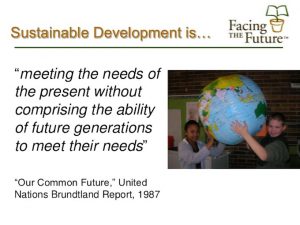By Kate Redman in Paris
A new study by the UNESCO Global Education Monitoring (GEM) Report shows secondary school textbooks from the 1950s until 2011 missed or misrepresented key priorities now shown as crucial to achieve sustainable development.
With textbooks only revised every 5-10 years, the analysis reveals the need for governments to urgently reassess their textbooks to ensure that they reflect core values for sustainable development, including human rights, gender equality, environmental concern, global citizenship and peace and conflict resolution.
Released around International Day of Human Rights, the analysis looked at secondary school textbooks in history, civics, social studies and geography.
The materials were drawn from the Georg Eckert Institute in Germany, which holds the most extensive collection of textbooks from around the world in these subjects.
The paper had the following key findings:
Human rights:
· The percentage of textbooks mentioning human rights increased from 28 percent to 50 percent between 1970-1979 and 2000-2011, with the greatest increase in sub-Saharan Africa.
· But, from 2000-2011, only 9 percent of textbooks discussed rights of people with disabilities and 3 percent cover the rights of LGBTI people.
· Only 14 percent of textbooks from 2000-2011 mention immigrant and refugee rights.
Gender:
· The percentage of textbooks mentioning women’s rights increased from 15 percent in the 1946-1969 period to 37 percent in the 2000-2011 period. Only a sixth of textbooks in Northern Africa and Western Asia mention women’s rights at all.
 · Despite the explicit messages advocating against gender inequality, gender bias remains a significant problem. Many textbooks, including in Algeria, France, Italy, Spain, Uganda, Pakistan, Iran, Turkey, Kenya and Zimbabwe show women in submissive or traditional roles like cleaning and serving men.
· Despite the explicit messages advocating against gender inequality, gender bias remains a significant problem. Many textbooks, including in Algeria, France, Italy, Spain, Uganda, Pakistan, Iran, Turkey, Kenya and Zimbabwe show women in submissive or traditional roles like cleaning and serving men.
· Some countries like Vietnam, have revised their textbooks to better illustrate gender equality.
Environmental issues:
· During 2000-2011, environmental protection or damage was discussed in half of all textbooks; more than double the percentage between 1970-1979.
· From 2000-2011, only 30 percent of textbooks discussed environmental issues as a global problem.
Peace:
· Only 10 percent of textbooks from 2000-2011 explicitly mention conflict prevention or resolution. Sri Lanka is one country that has introduced reconciliation mechanisms into textbooks recently in order to promote peace and social cohesion.
· Over half of 72 secondary school textbooks analysed in 15 countries related Islam and Arab societies to conflict, nationalism, extremism or terrorism.
Global citizenship:
· From 2000-2011, 25 percent of textbooks mention global citizenship, compared with 13 percent in the 1980s.
· But, 60 percent of countries’ textbooks in the late 2000s have no mention of activities outside of their borders.
Aaron Benavot, Director of the GEM Report UNESCO, said: “Textbooks convey the core values and priorities of each society and are used extensively in classrooms around the world to shape what students learn.
“Our new analysis shows the extent to which most former students now in their 20s were taught from textbooks that had little if anything to say about the core values of sustainable development.
“Textbook revision is infrequent, and often involves slight revisions, rather than overhauls of content. In addition, governments simply don’t realise just how out of touch their textbooks are. Our research shows that they must take a much closer look at what children and adolescents are being taught.”
The GEM Report calls on governments to urgently review the content of their textbooks to ensure values are in line with the principles in the new UN Sustainable Development Agenda (SDGs).
It calls for the values of the SDGs to be built into national guidelines used during textbook review, and taught in workshops for textbook writers and illustrators.
A checklist of highly relevant textbook content that governments should look out for when reviewing currently approved textbooks is included in the paper.
A separate version of that list is available for teachers and students to use in classrooms, enabling them assess their own textbooks, and hold their governments to account.














































